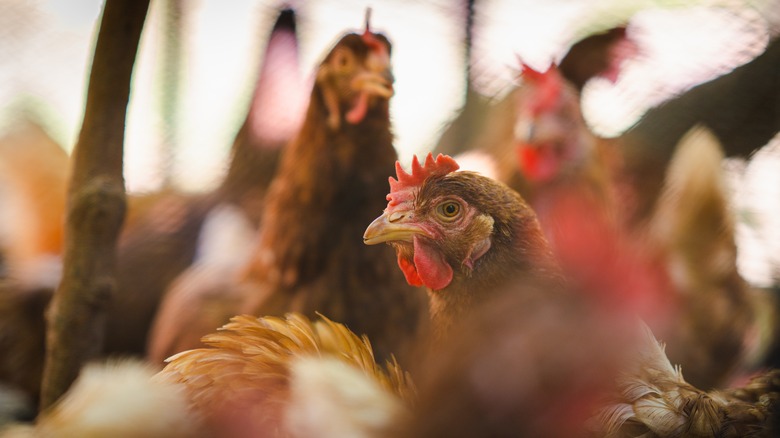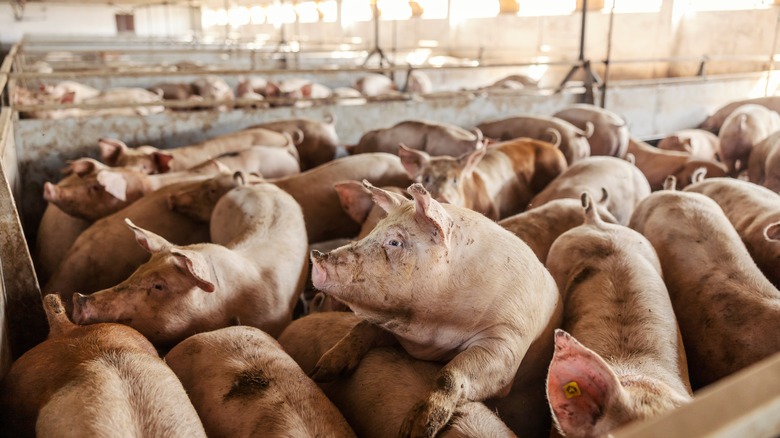The Mystery Of Why Billions Of People Don't Eat Pork
It's difficult to get a hard figure for the number of people in the world who don't eat pork. Estimates on Quora using the number of Jews, Muslims, Buddhists, and Hindus (all people from faiths that prohibit/restrict either pork or meat eating more generally) put the figure at a touch under 3 billion people. Of course, not everyone practices their religion the same way, and some people don't eat pork for non-religious reasons, but it's safe to say that a significant chunk of the world's population rejects pork.
This is striking given how revered pork is within the food traditions where it is accepted. Barbecue is basically its own religion by now. Bacon's deliciousness has been memed into oblivion. Prosciutto is one of the world's finest delicacies. So what gives? Why does a solid third (or more) of the world's population avoid a meat that much of humanity can't get enough of? The answers are complicated, uncertain, and stretch back in time basically as far as recorded human history.
The Bible prohibits pork consumption
According to Oxford Biblical Studies Online, the root of many people's pork avoidance can be found in the Bible, particularly the Hebrew Bible (or what is known to Christians as the Old Testament). Deuteronomy 14:5-8 is explicit in its prohibition of pork consumption: "You may eat any animal that has a divided hoof and that chews the cud ... The pig is also unclean; although it has a divided hoof, it does not chew the cud. You are not to eat their meat or touch their carcasses."
Of course, the rule against pork is just one of many dietary laws mentioned in the Hebrew Bible. That same passage from Deuteronomy also forbids the consumption of rabbits, hyrax, and camels. Knowing Jesus has a list of bible verses that include rules against eating aquatic animals that don't have fish and scales (i.e. shellfish) and things that died on their own (carrion). However, there is a clear and repeated revulsion when it comes to pork. For example, Isaiah 66:17 states, "Those who consecrate and purify themselves to go into the gardens, following one who is among those who eat the flesh of pigs, rats, and other unclean things — they will meet their end together with the one they follow." There is also an incident in Matthew where Jesus drives a hoard of demons into a herd of pigs. The origin of this disgust for pigs is a source of debate.
But pork was not always forbidden in ancient Israel
In ancient times, the land we now know as Israel was inhabited by several different populations, including the ancestors of modern Jews. Around 1000 BCE, European settlers called the Sea Peoples migrated to the southern part of the region, bringing pigs with them. The most prominent Sea Peoples culture, the Philistines, established a tradition of pork-eating in what became known as Philistia. Traditionally, it has been argued that the ancestors of modern Jews who lived in Southern Israel (known as Judahites), abstained from pork to differentiate themselves from the Philistines, though the article Iron Age Pigs in the journal Radiocarbon states that this may not have been a universal rule.
In contrast to the Judahites, Israelites in Northern Israel seem to have eaten a fair bit of pork during this time period, and pork was an important source of meat for them. However, many Israelite refugees had to move south when their kingdom collapsed in the 7th and 8th centuries BCE. The authors of Iron Age Pigs theorize that the Biblical pork taboo may date from this time period. The rule could have been used as a tool to assimilate Israelites into the pork-abstaining Judahite culture.
The Quran also bans pig-eating
Islam is an Abrahamic faith that shares many important beliefs, prophets, and traditions with Judaism and Christianity (via World History Encyclopedia). And just like the Bible, the Quran also explicitly forbids the consumption of pork, as well as certain other types of meat. Per Quran 5:3, "Forbidden to you are carrion, blood, the flesh of swine, the animal slaughtered in any name other than Allah's." There is an exception to this rule if a believer is in danger of starvation. "As for he who is driven by hunger, without being wilfully inclined to sin, surely Allah is All-Forgiving, All-Compassionate."
As in the Hebrew Bible, no explanation for this rule is given other than that God commands it and that pigs are unclean. However, abstaining from pork remains an important practice for many Muslims in the modern era. Per Oxford University, importing pork into Iran is a jailable offense. A 2021 Pew survey conducted in India found that 77% of Muslim respondents said that somewhat who eats pork can't be Muslim. This is quite a high figure considering that only 60% of the surveyed group said that you have to believe in God to be considered a Muslim.
Many Hindus abstain from pork
The relationship between Hindu practices and eating meat is complex. Beef is prohibited because cows are sacred in Hinduism. Although vegetarianism is encouraged by the religion's theology, a majority of Hindus in India are not vegetarian, according to a Pew survey. However, most Hindus in the country do restrict their meat consumption in some way. For some, this includes avoiding pork.
Although pork is not banned by Hindu religious texts, it historically has been viewed as unclean meat in India, according to the South China Morning Post. As in Israel, this was not always the case; in ancient times, textual evidence suggests that pork consumption was somewhat widespread in India. However, this changed in the 16th century when the country was ruled by the Mughal Empire. The Muslim Mughals initiated a cultural shift around pork that pervaded Indian society and led a majority of the population to consider pork to be unclean.
In modern times, the attitude toward pork among Indian Hindus is starting to change again, as pork is becoming a gourmet treat in the country. In 2022, India began allowing the importation of U.S.-raised pork into the country, setting the stage for a porky renaissance.
Thinkers have been trying to explain the pork taboo for centuries
As we have covered, the sacred texts of Judaism and Islam, two religions that emerged in the ancient Middle East, both ban pork, but the underlying reasons why the population in this region turned against the other white meat are debatable. Thinkers have been trying to explain the pork taboo for centuries. Philo of Alexandria, a 1st century BCE Jewish scholar, asserted that pork was too delicious and would lead to sinful eating habits. "Now of land animals, the swine is confessed to be the nicest of all meats by those who eat it ... [Moses] has forbidden with all his might all animals, whether of the land, or of the water, or that fly through the air, which are most fleshy and fat, and calculated to excite treacherous pleasure" (The Special Laws 4:100).
Maimonides, a 12th-century CE Jewish philosopher, argued in favor of the pork taboo from the opposite perspective, saying that pigs were the most disgusting and loathsome of all animals because they live in very dirty conditions. In Guide for the Perplexed 3:48, he also claimed that pork is unhealthy for people to eat: "Pork contains more moisture than necessary [for human food], and too much of superfluous matter."
Some have theorized that it had something to do with Trichinella worms
Pork sometimes contains a parasite called Trichinella worms. These worms can make people sick with an illness called trichinellosis or even kill them (via Parasite). The parasite, and its connection to pork, was discovered in the 1800s. Swiftly after Trichinella worms were discovered, some people pointed to them as a rational explanation for the pork taboo. After all, if pork makes you sick, it would make sense to prohibit eating it, right?
As Marvin Harris points out in his book "Cows, Pigs, Wars, and Witches," the trichinellosis hypothesis has some serious weaknesses. For one, the parasites are only a risk if pork is undercooked, and he argues that pork was not significantly riskier than any other meat in the ancient world in this respect. Back then, undercooked beef could expose you to all sorts of nasty parasites like tapeworms. And goats, sheep, and cattle in some ways posed greater risks to human health than pigs did, as they could transmit infections like Brucellosis and anthrax to people. There is considerable evidence to suggest that people in Biblical times knew that ruminant animals carried these infections, but no compelling reason to believe that ancient people were aware of Trichinella worms in pork.
Marvin Harris argued there were practical reasons to avoid pigs
Columbia University anthropologist Marvin Harris theorized extensively about the source of the pork taboo in Jewish and Muslim cultures. In a 1977 piece for The Washington Post, he wrote that the ancient Middle East experienced a period of widespread desertification as the population rose. What had once been fertile, forested land with many water sources turned into an arid desert with scarce water. He argued that this made the region poorly suited for raising pigs, as pigs competed with humans for food sources like grain. Cows, sheep, and goats, on the other hand, could forage on grasses that still grew naturally even as the region dried up.
Furthermore, the hot, dry, sunny climate may have contributed to ancient Middle Easterners' perception of pigs as unclean animals. In those conditions, pigs have to wallow in mud (or even feces) to stay cool. In temperate, shady climates, pigs can stay much cleaner and don't need to wallow.
Harris supports his hypothesis by referencing the fact that pig consumption declined all over the Middle East between 2000 and 3000 BCE, and not just among Israelites. Egyptians and Mesopotamians also began shunning pork during this period. This suggests that pig avoidance came from practical concerns, not just cultural factors.
Another scholar suggests that chickens were better animals for the Middle East
Richard W. Redding's article The Pig and the Chicken in the Middle East in the Journal of Academic Research echoes Harris' theories about pork becoming an impractical food source in the Middle East and expands on them by suggesting that chickens essentially replaced pigs in Middle Eastern agriculture.
Chickens did not arrive in the region until somewhere around 1000 BCE. In many ways they serve a similar function to pigs in the food system: they eat the same food sources as humans do, but transform them into nutritious meat that can play a valuable role in the human diet. However, chickens may have been better suited to this purpose than pigs were, at least in the Middle Eastern climate. They convert food and water into protein more efficiently. They're also small enough that it's easy to eat a whole chicken before it goes bad in the heat. Furthermore, you can keep your chickens alive instead of eating them and they will produce eggs for you.
Cultural reasons may have been a defining factor in pork prohibition
While the practical, materialist supporting arguments for the pork taboo from Harris and Redding are compelling, they are ultimately unproven theories. Cultural factors may have played just as important a role as practical concerns. An article in the Journal for the Study of Judaism argues that pork avoidance didn't take on a special significance for the Jewish population of Israel until the territory came under the control of pork-eating Romans. It was then that not eating pork was used by Israelites as a way to set themselves apart from their Hellenized Roman conquerors and pork consumption became viewed much more unfavorably.
The cultural separation between Jews and their pork-eating rulers, neighbors, and oppressors became very pronounced over time. In some historical contexts, pork avoidance was synonymous with Jewishness. The ruler Antiochus tried to crush Judaism by feeding pork to the Jewish high priest and pouring pork blood all over the Temple. His persecution led to the revolt by the Maccabees that is commemorated by the Hanukkah celebration every year (via Jewish News Syndicate). In Medieval Europe, Christians used pigs as anti-Semitic symbols, while Jews viewed pigs as embodying the negative qualities of their Christian oppressors. Long after pork avoidance served any potential practical purpose (such as when Jews moved to temperate Europe), it had deeply entrenched cultural and religious meanings.
Pork has a complicated history in modern Israel
Just as pork had a multifaceted role to play in ancient Israel and the Middle East, its place in modern Israeli society continues to be hotly debated. While many observant Jews in the present day still follow the Biblical proscription against pork, there are also many secular Jews who do not. Not to mention that there are also Christians in Israel who have no religious reason not to eat pork. According to the Atlanta Jewish Times, pork was banned in Israel in 1961, but the law was quickly amended to allow Christians to raise pork for their own consumption within the country. Pork pita sandwiches were commonly served in Tel Aviv (the hub of secular culture in Israel) in the mid-20th century as well.
In the '90s, secular immigrants from Russia brought their taste for pork to the country. Then in the 2010s, a rising gourmet movement made pork a hot meat in Tel Aviv restaurants, per Slate. Since importing non-Kosher meats to Israel is still banned for the most part, the country's increasing appetite for pork must be fed by domestic producers, and supplies are limited, so pork is something of a luxury. Despite its recent trendiness, there is still a lot of opposition to pork consumption within the country, and debate continues over whether it is acceptable to serve pork.
Pork's role in the African American diet is also fraught
Not everyone who rejects pork does so for religious regions. Beginning during the Civil Rights era, many Black Americans began turning their backs on pork (via How to Eat to Live). In some cases, this decision did have a religious component, as it became common for African Americans to convert to Islam during this time. However, the reasons for the turn away from pork went beyond religion, and many non-Muslim African Americans also stopped eating pork as well.
Pork, along with corn, was a staple of the slave diet forced on captive Black Americans. It later became a popular meat in soul food, a cuisine that evolved from the traditional dishes that were cooked during the time of slavery. Although pork-heavy soul food and barbecue were (and are) still beloved, some politically-conscious African Americans in the mid-20th century began to perceive soul food as an extension of the slave diet, a relic of colonialism and oppression that needed to be rejected. Pork was also viewed by many as unhealthy in general. Vegetarianism became popular during this period as well. Rejecting colonized cuisine and choosing to eat healthy food came to be viewed as pillars of culinary Black nationalism. The lingering effects of this movement continue to complicate the narrative around eating pork in America.
People now may not eat pigs for animal welfare reasons
In addition to political concerns, there is another relatively modern reason why some people may choose not to eat pork: animal cruelty. Per The Washington Post, the vast majority of pigs in America are raised in extreme confinement. Whatever you think about the ethics of eating meat in general, you may have some qualms about the specific practices used by the American pork industry.
Of course, factory farming is not limited to pork production in America, but some people may be reluctant to eat pigs in particular because they are very smart. A comparative review published in the International Journal of Comparative Psychology concluded that pigs are intelligent and have deep social and emotional lives. The study's authors compare pig cognition to that of dogs and chimpanzees. While whether or not to eat pork is ultimately a personal decision, one of the study's authors told HuffPost that she hopes her findings will convince some people to give up pork.












